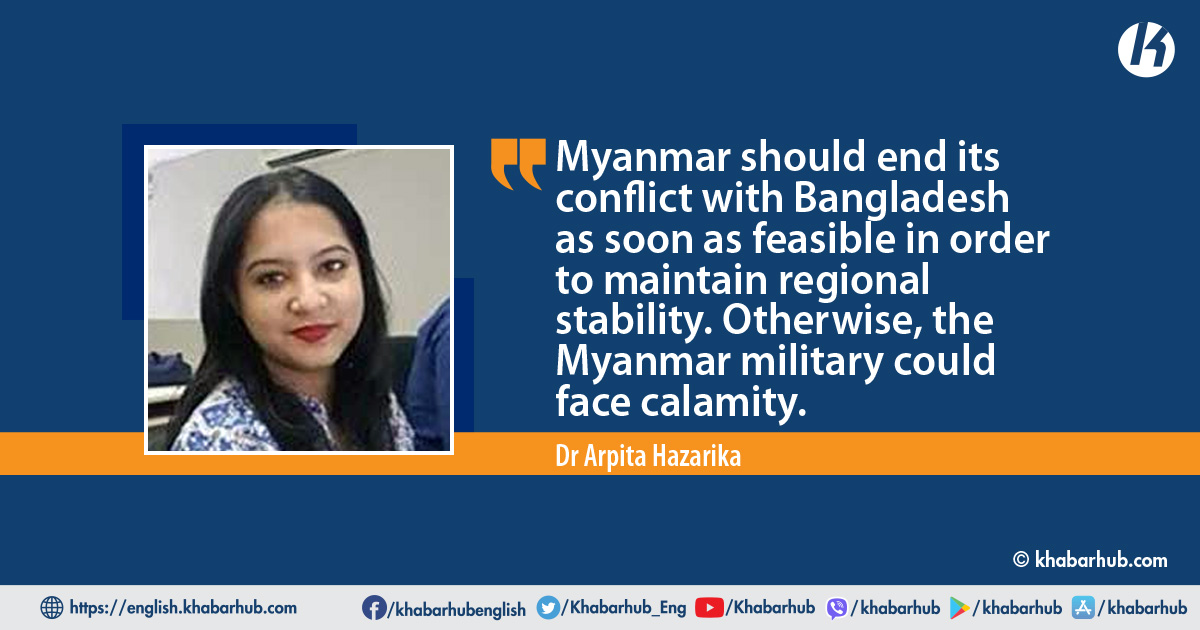It has been nearly six years since the mass exodus of Rohingya refugees from Rakhine State; hundreds of thousands of the Rohingya had to flee their homes in the wake of the Myanmar army’s brutal attempt at genocide — with them eventually finding solace and shelter within the borders of Bangladesh.
Since then, Bangladesh has continued to display the highest levels of compassion and humanity, sheltering the now well over a million Rohingya refugees, at great cost to its own resources.
Nevertheless, while we have continued to do our duty, the long-term solution has always been one and one only — the safe and dignified repatriation of the Rohingya refugees.
To that end, the 22-member delegation from Myanmar that is currently in Teknaf upazila of Cox’s Bazar to observe the preparations for the repatriation of Rohingya is, we hope, the first step on the road to repatriation for the refugees who have already suffered more than enough.
We welcome the fact that the delegation will verify the list of the Rohingya willing to return to Myanmar and also visit Rohingya camps — dialogue and civil discussions between Bangladesh and Myanmar have been severely lacking, and it is steps like this that can turn things around.
Moreover, we have seen Myanmar authorities delaying the repatriation process over and over again, using trivial excuses and arguments. In fact, every time there seemed to have been a breakthrough in the process, Myanmar found a way to throw a wrench into the whole thing.
However, while there appears to be a reason for hope, we must also remember that Myanmar has historically shown negligence in doing right by the Rohingya and facilitating a safe and dignified return back home.
The Bangladesh government has in the past provided a list of 862,000 Rohingya refugees to Myanmar authorities — and there has been no progress on that front at all.
The international community has been woeful in its response, and Myanmar has continued to enjoy impunity of the highest magnitude.
It is about time that the global community stops shirking responsibility and that collectively, pressure is put on Myanmar to start the repatriation process so that the Rohingya can safely go back home.
While this indicates that pressure from the international community has been effective to some extent, it is essential that the community does not take its foot off the pedal until Myanmar authorities live up to their responsibility of creating a safe environment for the return of the refugees, and completely end the persecution campaign against the Rohingya.
It is also important to remember that Myanmar has backtracked on most of its previous commitments. Therefore, there is no reason to take its words at face value unless there are substantial actions taken to back them.
The reason for the ongoing visit by the Myanmar delegation, according to Bangladeshi officials, is that there were some issues regarding the earlier verification process.
So, the delegation is apparently meeting the Rohingya in person and verifying their names, villages, towns, and other information.
Foreign ministry officials say that Myanmar has shown a growing interest in repatriation in recent times, and also arranged a trip for the ambassadors of ASEAN countries as well as Bangladesh, India, and China to the Rakhine State last week to show them the conditions there.
While all this sounds positive, we cannot ignore the fact that there have been two failed attempts at repatriation since 2017, when around 750,000 Rohingyas fled a military crackdown in Rakhine. And on both occasions, it was because of Myanmar authorities.
Following the coup in 2021 and the Rohingya refugee crisis, the Myanmar military is under intense international pressure to support democratic movements.
The latest visit comes ahead of the International Court of Justice’s (ICJ) planned hearing (scheduled for April 28) on the genocide case filed by The Gambia against Myanmar.
And we sincerely hope that Myanmar’s recent activities are not intended to somehow pull the wool over the court’s eyes.
However, that is not something that can be fully ruled out, as we have seen the Bangladeshi government appealing many times to the authorities in Myanmar to take steps for repatriation, only for it to be ignored.
Moreover, we have seen Myanmar authorities delaying the repatriation process over and over again, using trivial excuses and arguments. In fact, every time there seemed to have been a breakthrough in the process, Myanmar found a way to throw a wrench into the whole thing.
After hosting the Rohingya for more than five years, Bangladesh is now in a position where it cannot afford any more delays in repatriation.
That is why the government must work with the international community to continue the pressure on Myanmar authorities to expedite the repatriation process.
As a result, it is in Myanmar’s military’s best interests to resolve the issue as quickly as possible. The message is clear: Rohingya refugees do not want to remain in Bangladesh as refugees and do not tolerate Myanmar’s military injustice.
Given the speed at which Myanmar seems to be working currently, it might take a whole decade for all the Rohingya to return to Myanmar.
That would be completely unacceptable. While we cannot forget the humanitarian aspect of things, which means that safe conditions must be ensured for the Rohingya to return, the Myanmar authorities must be pressured to fulfill such conditions and complete the repatriation process much faster.
Following the coup in 2021 and the Rohingya refugee crisis, the Myanmar military is under intense international pressure to support democratic movements.
The Myanmar military may profit in the long run if it takes the initiative to return Rohingyas to Myanmar. Myanmar should end its conflict with Bangladesh as soon as feasible in order to maintain regional stability.
Otherwise, the Myanmar military could face calamity. Myanmar will not be able to withstand international pressure. Myanmar could profit from bilaterally settling the conflict with Bangladesh by reinforcing trade relations if the crisis is resolved.
As a result, it is in Myanmar’s military’s best interests to resolve the issue as quickly as possible. The message is clear: Rohingya refugees do not want to remain in Bangladesh as refugees and do not tolerate Myanmar’s military injustice.
(Views expressed in this opinion are the writer’s and does not necessarily reflect the editorial stance of Khabarhub)









Comment